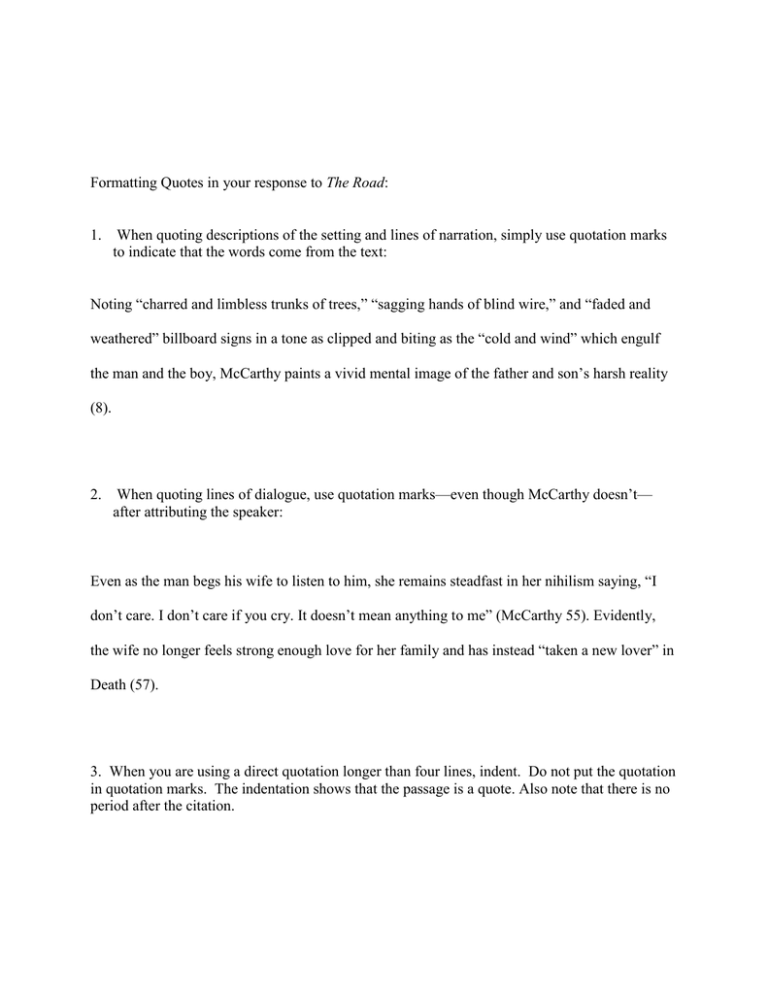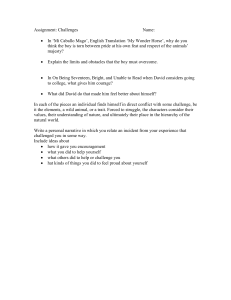The Road
advertisement

Formatting Quotes in your response to The Road: 1. When quoting descriptions of the setting and lines of narration, simply use quotation marks to indicate that the words come from the text: Noting “charred and limbless trunks of trees,” “sagging hands of blind wire,” and “faded and weathered” billboard signs in a tone as clipped and biting as the “cold and wind” which engulf the man and the boy, McCarthy paints a vivid mental image of the father and son’s harsh reality (8). 2. When quoting lines of dialogue, use quotation marks—even though McCarthy doesn’t— after attributing the speaker: Even as the man begs his wife to listen to him, she remains steadfast in her nihilism saying, “I don’t care. I don’t care if you cry. It doesn’t mean anything to me” (McCarthy 55). Evidently, the wife no longer feels strong enough love for her family and has instead “taken a new lover” in Death (57). 3. When you are using a direct quotation longer than four lines, indent. Do not put the quotation in quotation marks. The indentation shows that the passage is a quote. Also note that there is no period after the citation. Hiding from the group who imprison men and women in a basement, the Man and Boy cling to a threadbare line, letting go means getting caught and holding on, escaping; the Man, with only one bullet in the revolver, asks himself: Can you do it? When the time comes? When the time comes there will be no time. Now is the time. Curse God and die. What if it doesnt fire? It has to fire. What if it doesnt fire? Could you crush that beloved skull with a rock? Is there such a being within you of which you know nothing? Can there be? Hold him in your arms. Just so. The soul is quick. Pull him toward you. Kiss him. Quickly. (McCarthy 114) The Man faces what no father would ever dream of doing: killing his own child. Thrust into this world, the Man’s love for the Boy can only grow stronger, but his failure to kill his son truly highlights the Man’s deep and resounding bond for the Boy to an even higher level of Love. 4. You may have to do this with dialogue. Typically, in a novel, you would indicate speech with quotation marks in the excerpt, like this: Elroy Berdhal, realizing that Tim was in trouble, turned the situation around. Instead of being paid two hundred dollars for the bill, he found a way to get the money back to Tim: He took four twenties out of his shirt pocket and laid them on the table. “Call it even,” he said. “No.” “Pick it up. Get yourelf a haircut.” The money lay on the table for the rest of the evening. It was there when I went back to my cabin. In the morning, though, I found an envelope on my door. Inside were the four fifties and a two word note that said EMERGENCY FUND. (O’Brien 54) This act of generosity…. But with McCarthy, you won’t. Here’s how it would look: These traits are skillfully utilized particularly in the dialogue between the father and son, for though the conversations are clipped and generally simple, they nevertheless teem with emotion and meaning. In one instance, the boy asks his father: Did you have any friends? Yes, I did. What happened to them? They died. Do you miss them? Yes, I do Where are we going? We’re going south. Okay. (68) All of the other conversations between the boy and his father occur in a similar fashion, as the boy asks the father normal questions whose answers, due to the trying circumstances which have befallen the world, are painful to give. Of course you could do something like this too: These traits are skillfully utilized particularly in the dialogue between the father and son, for though the conversations are clipped and generally simple, they nevertheless teem with emotion and meaning. In one instance, the boy asks his father if he had any friends. When the father says he did, but that “[t]hey died,” the boy asks, “Do you miss them?” and all the man can say is “Yes, I do,” before they both remember to keep walking south (68).

